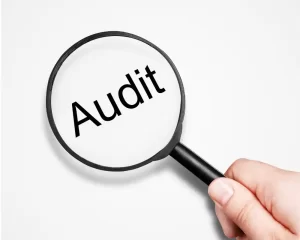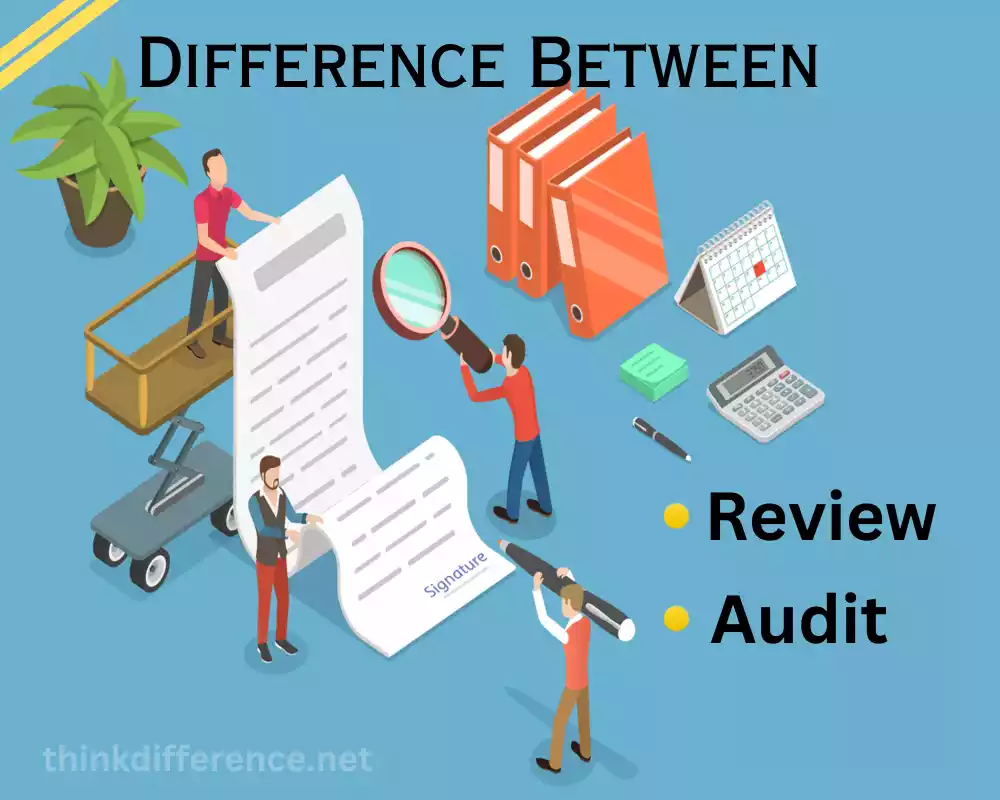Definition of Review and Audit
Review: Review is the systematic examination or evaluation of an object or subject with the goal of ascertaining its effectiveness, quality or compliance to predefined criteria. Reviewers typically employ individual assessment or team assessment with feedback as the end goal – individuals can conduct their review themselves or bring third-party experts.
They’re used in various contexts such as academia, business literature reviews, and product assessments, and even though less formal than auditing processes they still play an essential part when it comes to assessing and improving the subject being reviewed.
Audit: An independent audit examines the records, financial statements, and processes of an organization in order to ascertain their accuracy, fairness, and compliance with policies and regulations. An audit typically includes an exhaustive examination and verification of information and activities to give an objective evaluation of a company’s finances, internal controls, and compliance with legal or regulatory requirements.
Auditors usually operate independently from those they audit – their primary goal is assuring shareholders, investors, and creditors through quality, objective auditing practices; for this purpose, auditing guidelines are often provided.
Importance of reviews and audits in business and financial processes
Review and audit processes are vital components of running any successful business or financial process.
- Financial Integrity and Accuracy: Reviews and audits are conducted to verify accuracy and integrity in financial information, by inspecting records, transactions, and statements to detect any anomalies that might indicate fraud, errors, or irregularities in finances.
- Compliance with Regulations: Review and audit services assist organizations with complying with industry, legal, and regulatory standards. Financial and operational experts ensure that an organization abides by all laws and regulations related to its finances and operations.
- Risk Management: Reviews, audits, and assessments help organizations identify weaknesses or potential risks within their internal controls, systems, or processes that pose threats or hazards to assets or prevent financial loss; by evaluating risks thoroughly and taking necessary actions to limit or minimize them as part of risk reduction strategies.
- Confidence of Stakeholders: Reviews and audits give stakeholders such as creditors, investors, and shareholders confidence in an organization’s financial health and operation – this increases trust between stakeholders as they can encourage investments while helping make important decisions more easily.
- Process Improvement: Audits and reviews provide invaluable insight and recommendations to organizations looking to enhance processes by identifying areas for improvement like bottlenecks or inefficiencies in operations.
- Governance and Oversight: Reviews and audits serve to monitor management’s decisions and performance as they related to resource use within an organization, by their goals. They serve as independent assessments which verify resource allocation according to organizational values.
- Fraud Detection and Prevention: Audits can play an invaluable role in helping companies detect and thwart fraudulent activities within an organization, by looking closely at financial documents and transactions and searching for signs of potential misconduct.
- Due Diligence and Mergers/Acquisitions: Due diligence processes and mergers/acquisitions rely heavily on reviews and audits as part of informed decision-making for informed decisions to be made about financial positioning, risks, performance evaluation, and the reduction of legal or financial risks.
Review and audits are impartial analyses designed to verify compliance, accuracy, and reliability to maintain financial security and uphold an organization’s reputation while supporting informed decisions and encouraging stakeholder trust.
What are Review?
Reviews provide objective evaluations of products, services, or literature to form opinions regarding the quality, value, or merits of these offerings.
Reviews are assessments made by customers or experts about products or services to communicate their experience, level of satisfaction, and recommendations to others. Reviews help consumers make more informed choices by including the opinions of others who have used a particular item or service before them.
Literary reviews provide in-depth examination and critical evaluation of books, articles, or other works published as literature. Literary critics assess writing style, content themes and overall merits when conducting literary reviews.
Reviews of performing arts refer to evaluations made on live performances such as concerts, plays, or dance shows by critics or reviewers who evaluate various elements such as acting, music, and choreography as well as stage design and overall impact of each live show. They then offer their subjective judgment regarding its artistic value and quality.
Reviews can be found across various forms, such as newspapers, magazines or review websites. Reviews play an essential part in shaping public opinion as well as supporting literary enthusiasts and informing consumer decisions.
Consider that reviews can differ widely depending on an individual’s experiences and needs, thus reading several reviews can give an excellent way to gain more insight into a product, helping make informed decisions tailored to meet those specific to you.

What are Audits?
An audit is an independent examination of records, financial statements, or operations within an organization to assess its accuracy, fairness, and compliance with existing legislation or standards. Auditors typically operate outside the entity they’re auditing to provide objective opinions that do not fall under the influence of those being examined by being objective themselves.
An audit’s primary goal is to offer an opinion as to the reliability and fairness of its subject. Financial statement audits are one common type, where auditors inspect the financial statements of an organization to make sure that they adhere to relevant accounting standards and principles.
Auditors gain evidence during an audit by performing detailed testing, verifying, analyzing, and examining financial records, transactions, and internal controls as well as supporting documents. Auditors use various auditing methodologies and procedures to collect sufficient audit evidence.
Audits serve many functions and benefits for stakeholders like investors, shareholders, creditors, and regulatory bodies. Audits provide reasonable assurances about the accuracy and reliability of financial information which provides transparency and accountability among them all. Audits also aid risk management efforts by highlighting weaknesses or inefficiency within internal processes or controls and suggesting ways to enhance them; their services also facilitate improvement recommendations to management bodies or policy-making.
Audits go beyond financial statements – they can also evaluate compliance with industry standards, laws, and regulations as well as internal controls and governance processes in organizations. Internal auditors typically perform these reviews.
After an audit, an audit report will be prepared that sums up and presents findings with opinions or conclusions as well as offering improvements or corrective actions, where necessary.
Audits provide essential oversight in financial data accuracy, compliance evaluation, and risk mitigation management, providing stakeholders with reliable assessments of operations and finances within an organization.

Differences Between Reviews and Audits
There are various key differences between reviews and audits, such as their level of assurance, objectives and goals, testing depth/extension requirements, and reporting requirements. Here are a few key distinctions:
Level of Assurance:
- Review: Reviews provide limited assurance. They aim to give a reasonable degree of reassurance that a subject matter is free from material errors or misstatements; however, they cannot give absolute reassurances in this respect.
- Audit: Auditors provide sufficient assurance, offering greater trust in the accuracy and completeness of information than reviews can. Their level of assurance surpasses reviews in terms of effectiveness.
Objectives and Goals:
- Review: A review’s purpose is to assess the legitimacy of the material presented, identify any errors or major concerns with its presentation, provide feedback or suggest improvements for further development and offer any suggestions that can aid future efforts at learning or growth.
- Audit: An audit seeks to provide an opinion as to the fairness and accuracy of something (usually financial statements ) using evidence obtained during its investigation.
The extent of Testing and Examination:
- Review: Reviews may include analytical procedures, inquiries, and limited testing compared to audits which tend to involve extensive procedures and extensive examination.
- Audit: An audit involves conducting an in-depth investigation and examination of financial records and transactions, internal control systems, and supporting documents to obtain enough audit evidence for inspection purposes. Auditors use detailed procedures in their investigation.
Independence and Qualifications:
- Review: Reviewers may include both internal or external consultants with relevant expertise as well as those that have some sort of affiliation to what’s being reviewed – both may serve as reviewers on various levels ranging from staff positions within an organization to external consultants with connections or interests in what’s being assessed.
- Audit: Auditors must remain impartial; they cannot have any financial or personal ties to the organization being audited. Professional auditors typically possess certifications such as Certified Public Accountant or Certified Internal Auditor.
Reporting Requirements:
- Review: Reviews usually lead to the production of a report that provides an overview of key findings, observations, and recommendations – without offering opinions about any specific issue or subject.
- Audit: An audit produces a report detailing the auditor’s opinion regarding fairness and accuracy in an area audited, providing independent assessments that may include suggestions for improvement.
Audit standards and requirements differ between jurisdictions and industries. When choosing to conduct an audit or review, organizations should carefully consider their needs, regulatory obligations, and level of assurance when making their decision.
When to Conduct a Review
In many circumstances, conducting an informal and comprehensive assessment will suffice in certain instances a more formal review might be warranted.
- Periodic Financial Reviews: Organizations can conduct periodic financial reviews to assess the accuracy and reasonableness of financial statements, identify errors or issues and offer feedback – this ensures financial data remains reliable without necessitating a full audit.
- Internal Control Assessments: Reviews can be conducted to examine the efficacy and efficiency of internal controls within an organization, to detect weaknesses or gaps and make suggestions to strengthen them.
- Compliance Reviews: Organizations commonly conduct compliance reviews to assess whether they are adhering to internal policies, standards, or regulations. Such reviews allow companies to identify areas where compliance may not exist and suggest remedial steps that reduce risks.
- Project and Process Reviews: Reviews can provide an effective means of gauging the efficiency and effectiveness of specific projects or processes within an organization, helping identify areas for improvement as well as bottlenecks or risks that might impede project completion or process optimization.
- Performance Reviews: Review are conducted to measure the performance of individuals, and teams, within an organization and identify areas for improvement as well as strengths and weaknesses.
- Product or Service Reviews: Industries that serve consumers conduct product or service reviews to assess the quality, functionality, and overall consumer experience of products or services they sell or provide. Such assessments allow businesses to identify areas for improvement by collecting customer feedback or reviewing results of previous reviews conducted against products/services purchased previously by consumers.
- Risk Reviews: Organizations may conduct reviews to analyze specific risks or processes related to risk management. Such reviews can assist organizations in recognizing emerging risks, measuring the effectiveness of reduction strategies, and offering suggestions on improving their framework for risk control.
Decisions on when and why to perform reviews depend on an organization’s needs, objectives, risks, and resources – these will dictate when reviewing becomes appropriate or necessary.
When to Conduct an Audit
Audits require an in-depth and exhaustive examination of their subjects, which could make an audit necessary in certain instances:
- Financial Statement Audits: Financial statement audits are among the most frequent forms of audits performed to verify whether the financial statements of an organization comply with accounting standards and principles, making these checks obligatory for publicly-traded or regulated entities.
- Statutory Audits: In many jurisdictions, public companies, government agencies, and non-profits must conduct mandatory statutory audits under law in order to meet legal and regulatory obligations. These statutory audits assess adherence to specific legal or regulatory obligations in an organization’s environment.
- External Audit Requirements: External stakeholders such as investors, lenders, and business partners often require external audits to gain assurance about an organization’s financial performance, reliability, and position before entering financial transactions with it.
- Compliance Audits: Compliance auditors evaluate an organization’s adherence to specific laws, regulations, or industry standards to verify if its operations comply with legal frameworks and regulatory constraints.
- Internal Audits: Internal auditing services are performed by internal auditors as part of their role within an audit function, who assess and report on internal control effectiveness as well as governance processes and risk management measures. Internal auditors provide valuable insight and recommendations to enhance operational efficiency while decreasing risks.
- Special Purpose Audits: Special purpose audits are performed for specific objectives and areas of focus. Audits may focus on particular projects, processes, systems, or transactions while some special-purpose audits aim to detect fraud or assess specific risks.
- Due Diligence Audits: When merging, acquiring, or conducting business transactions, due diligence audits must be performed to assess the financial performance, risks, health status, and implications associated with any proposed merger, acquisition, or transaction. Such assessments allow an acquiring party to evaluate financial ramifications as well as risks inherent to this undertaking.
Decisions on when and why to conduct audits will depend upon legal, regulatory, and stakeholder expectations as well as the complexity of topics or the need for independent verification. Before making their choice about when and why to perform an audit, organizations must consider these factors and establish what level of assurance is desired.
Conclusion
Review and Audits are indispensable tools for any business seeking sustainable success in today’s competitive landscape. They provide valuable insights into a company’s performance, compliance, and areas for improvement. By conducting regular and comprehensive reviews and audits, businesses can identify opportunities, mitigate risks, and make informed decisions to drive growth and profitability.



